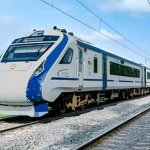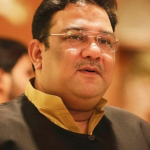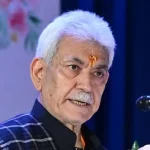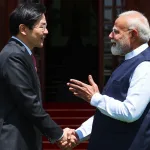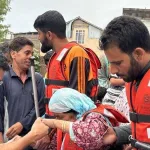In a small village nestled in the lush green valleys of South Kashmir’s Anantnag, about 30 kilometers from the district headquarters, where the picturesque landscape contrasts with the harsh realities of life, Farah’s story stands as a somber reminder of the gaps in our healthcare system. A 37-year-old mother of three, Farah embodied resilience and love, her life centered on her family and her role as their anchor. But beneath her cheerful demeanor, she endured persistent abdominal pain, frequent vomiting and unexplained weight loss. When her symptoms grew unbearable, her family brought her to GMC Anantnag, where her worst fears were confirmed: she was diagnosed with stomach cancer.
The journey was harrowing. The doctors at Radiation Oncology Department of the hospital initiated neo-adjuvant chemotherapy, shrinking the tumor and reducing the nodal burden surrounding the tumor, enough to make her a candidate for surgery. The surgery, though difficult, offered her a chance at life. However, the battle was far from over. The doctors at the Radiation Oncology Department of the hospital recommended adjuvant radiotherapy treatment to destroy residual cancer cells and reduce the risk of recurrence—a critical step for many cancer patients.
Yet this was where the system failed her. But GMC Anantnag, though pivotal in providing chemotherapy and palliative care, lacked a radiotherapy facility. The nearest radiotherapy center was over four hours away in Srinagar, and the financial burden of repeated travel, combined with the emotional strain of leaving her children behind, was insurmountable for her family. Farah postponed her treatment, hoping for a miracle.
Farah walked into the Radiation Oncology Department at GMC Anantnag after a long gap of nearly 08 months. Her frail frame barely carried the weight of her suffering. Her skin clung to her bones, her cheeks hollow, and her eyes sunken. She had been experiencing persistent vomiting, abdominal pain and worsening physical state for weeks but delayed seeking help, fearing that the doctors at GMC Anantnag will refer her again to Srinagar based hospital for radiotherapy treatment.
Investigations followed and Farah was deemed unfit for any treatment since the cancer had not only recurred but spread to her liver and other distant organs. She was put on palliative and supportive care and, after a painful battle, passed away three months later. Her story ended tragically, leaving her family grappling with grief and guilt over the care they couldn’t afford. Farah’s story is tragically common, highlighting the dire need for accessible radiotherapy services in South Kashmir.
Cancer: A Growing Burden in South Kashmir
Cancer is no longer a rare disease in Kashmir. In South Kashmir alone, GMC Anantnag caters to a population exceeding 25 lakh, including the districts of Anantnag, Pulwama, Shopian, and Kulgam, along with patients from the Chenab Valley and Pir Panjal region. Despite this vast catchment area, the hospital has limited resources to address the growing cancer burden. Since the inception of its Radiation Oncology Department, over 1,800 cancer patients have been registered. This figure does not account for patients who never seek treatment, deterred by financial challenges, logistical difficulties, or lack of facilities at the hospital.
According to the Population Based Cancer Registry Programme, the incidence of cancer in Jammu and Kashmir has seen an alarming rise in recent years. Cancer rates in Anantnag are the second highest in Kashmir, after Srinagar, and South Kashmir alone contributes nearly one- third of the total cancer cases in the region. This burden is exacerbated by factors such as poor awareness about early detection, limited availability of diagnostic facilities, and the absence of crucial treatment services like radiotherapy.
Between 2019 and 2022, an estimated 51,577 cases of cancer were reported in J&K. As per the data from PBCR, Pulwama has an incidence rate of 325 cases per lakh population; Kulgam & Shopian have a matching rate of around 307 cases per lakh population while Anantnag has an incidence rate of about 232 per lakh population. Global studies suggest that nearly 60-65% of patients require radiotherapy at some point during their treatment. These figures underscore the necessity of accessible, timely radiotherapy services. Yet, the reality in South Kashmir is stark: patients who need radiotherapy are forced to travel long distances to Srinagar for their treatments. This often leads to delays and disruptions, thereby significantly impacting the effectiveness of their treatment, leading to worsened outcomes and, tragically, higher mortality rates.
The Role of Radiotherapy in Cancer Care
Radiotherapy is a vital component of modern cancer treatment, required by 60-65% of patients at some stage of their journey. Its applications are diverse:
- Curative Treatment: Radiotherapy can eliminate cancer cells and prevent recurrence when used alongside surgery and chemotherapy.
- Palliative Care: It alleviates pain and improves the quality of life for patients with advanced cancer.
- Pre-Surgical Use: Known as neo-adjuvant therapy, it shrinks tumors to make surgeries more effective.
- Post-Surgical Use: Also known as Adjuvant therapy. It targets any remaining cancer cells, reducing the risk of the disease returning.
For patients like Farah, timely radiotherapy could mean the difference between life and death. Studies show that patients who receive uninterrupted, localized radiotherapy have significantly better outcomes. A study by the American Cancer Society found that radiotherapy improves survival rates by up to 40% in patients with early-stage cancers when used in combination with surgery and chemotherapy. This makes access to radiotherapy a critical factor in ensuring better survival outcomes for cancer patients. However, the absence of such facilities at GMC Anantnag forces patients to undertake physically and financially draining journeys to Srinagar, a reality that pushes many to forego treatment altogether.
Delivering Chemotherapy in Challenging Circumstances
GMC Anantnag has been offering chemotherapy services to cancer patients for years, despite being set up in a makeshift setting. Thousands of patients have received life-saving treatments in conditions with limited resources and facilities. Yet, the dedicated medical staff at GMC Anantnag continues to provide chemotherapy, often as a last hope for those who cannot afford the high costs and logistical challenges of seeking care outside the region.
This makeshift arrangement highlights the resilience of both the healthcare providers and the patients, but it also underscores the urgent need for a permanent and well-equipped oncology department at GMC Anantnag. Radiotherapy, like chemotherapy, is an indispensable part of cancer treatment, and the lack of radiotherapy facilities at the hospital places additional strain on both patients and the already overburdened healthcare system in Srinagar.
Relieving the Burden on Srinagar Hospitals
The over-reliance on Srinagar’s tertiary hospitals, such as SKIMS and SMHS, has created a bottleneck in cancer care. These institutions, though equipped with advanced facilities, are overwhelmed by the sheer number of patients from across Jammu and Kashmir. The influx of patients leads to long waiting lists and stretched resources, compromising the quality of care for all.
For families in South Kashmir, the logistical challenges are immense. The journey to Srinagar is not just a matter of distance but one of significant financial and emotional strain. Costs for transportation, accommodation, and daily sustenance quickly add up, often amounting to more than the treatment itself. Patients who cannot afford these expenses are left with no choice but to abandon their treatment plans.
Establishing a radiotherapy unit at GMC Anantnag would decentralize cancer care, reducing the burden on Srinagar’s hospitals while ensuring timely treatment for patients in South Kashmir. By empowering GMC Anantnag, the government would be addressing a long-standing inequity in healthcare access, allowing Srinagar’s hospitals to focus on specialized cases while alleviating overcrowding.
A Vision for the Future
Transforming GMC Anantnag into a comprehensive cancer care center is not just a dream—it is an achievable goal with far-reaching benefits. Here’s how this vision can become a reality:
- Advanced Radiotherapy Technology: Installing state-of-the-art equipment like linear accelerators and brachytherapy units will enable precision treatments, improving patient outcomes.
- Workforce Development: The recruitment and training of radiation oncologists, radiation therapists, medical physicists and other treatment supporting staff are critical for delivering high-quality care.
- Comprehensive Cancer Support: Offering services such as nutritional counseling, psychological support, and palliative care will address the holistic needs of patients and their families.
- Awareness and Prevention Campaigns: Educating the community about early detection and the importance of completing treatment will save lives and reduce stigma.
- Infrastructure Expansion: Building a dedicated oncology block with integrated services will streamline care and foster a supportive environment for patients.
In addition, funding for specialized cancer care units would allow GMC Anantnag to provide more comprehensive services, further relieving the pressure on Srinagar hospitals and ensuring that patients in South Kashmir can receive world-class care closer to home.
A Call to Action
Farah’s story is a tragic reminder of the human cost of systemic gaps in healthcare. It underscores the need for immediate government action to bridge these gaps and ensure that no patient in South Kashmir ha to choose between survival and financial stability.
The government has already demonstrated its commitment to improving healthcare through initiatives such as the Ayushman Bharat scheme (ABPMJAY) and the establishment of new medical colleges. By prioritizing the addition of radiotherapy services at GMC Anantnag, it can extend this commitment to cancer care, addressing a critical need in the region. This investment is not just about building infrastructure; it is about restoring hope and dignity to thousands of patients and their families.
Farah’s legacy should serve as a rallying cry for change—a reminder that every life is precious and that equitable healthcare is a right, not a privilege. The time to act is now. With collective will and decisive action, GMC Anantnag can become the lifeline that South Kashmir desperately needs—a beacon of hope in the fight against cancer.
(The Author is Sr. Radiation Therapist, Registered Professional with AERB, Govt of India. Fellow Member ARTI. Email: [email protected])



